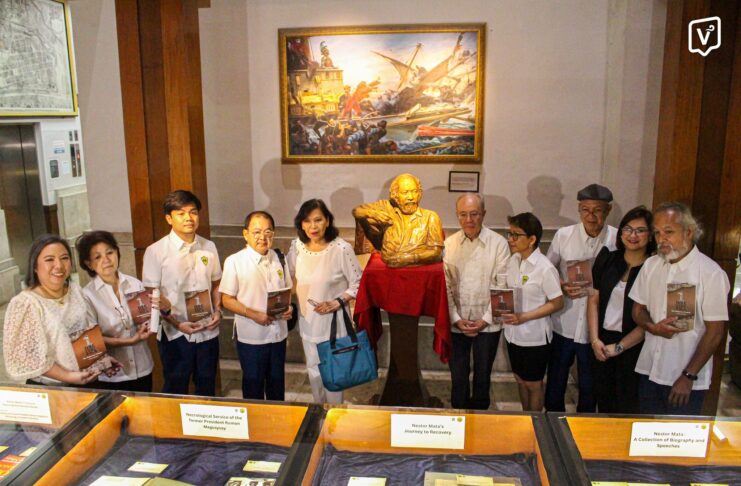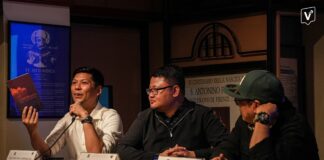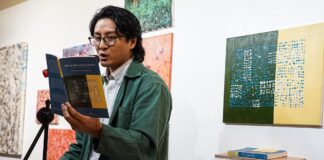Divine Dimalanta

IN LITERATURE, there are no double standards.
As part of its series paying tribute to women of letters, the Ateneo Library of Women’s Writings (Aliww) honored literary icon Ophelia Dimalanta in the 13th Paz Marquez-Benitez Memorial Lecture and Exhibit last Dec. 4 at the Science Education Complex of the Ateneo de Manila University. Kicked off in 1995, the event, named after literary matriarch Paz Marquez-Benitez, is an annual tribute to Filipino women-writers who have greatly influenced and shaped Philippine literature.
“Even if the poet’s language is in a way gendered, and even if the woman poet speaks most of the time of women, she speaks to all, regardless of gender,” Dimalanta said in her remarks thanking Ateneo for the tribute.
To the death of the sign

DISCLAIMER
Although these words cannot lay claim to such philosophical excellence of the kind that can begin or end an intellectual era, all that one implores of a reader is a listening mind to another mind’s wonderment at the world we live in. But why worry? In the end, as good friends would often say of our ceaseless doubting: who can tell you what to believe?
Prolegomena
Man thrives on representations. And it will be the death of him.
When something absent needs to be present, man creates something to stand for it. Or when a thing is too great or too minuscule to be there just as it is, a symbol must exist for it. But while these proxies have become the pillars of human life, it cannot be denied that they have placed us farther from the truth.
50 years of the mighty PEN
THOMASIAN TITANS of Philippine letters as well as other writers and academicians from around the nation stood side by side with art pieces as timeless as their pen and imagination in the halls of the National Museum last Dec. 8 and 9 during the golden anniversary of the Philippine Center of the International PEN (Poets and Playwrights, Essayists, Novelists), the foremost writers’ group in the country.
Founded in 1957 by National Artist and UST Varsitarian alumnus F. Sionil Jose, the Philippine Center is the local branch of the PEN, the prestigious international federation of writers, which is recognized by the Unesco. Reaffirming UST’s contributions to the establishment of the Philippine PEN, the 50th anniversary was supported by UST and the Varsitarian.
With the theme “Literature, Nation, and Globalization,” the two-day congress tackled currents and issues affecting Philippine letters in the era of globalization.
Journalism junior bags Rector’s Literary Award
JOURNALISM junior Khristine Joy Pulumbarit not only broke the two-year no-grand-prize drought in the Sanaysay category; she also won the Rector’s Literary Award of the 23rd Ustetika, held in splendid ceremonies amid the dancing fountain and bright Christmas lights of the UST Quadricentennial Park last Dec. 15.
Pulumbarit won the first prize in the essay-in-Filipino category with her entry, Sasampalin Kita ng Flip-flops e!, which scrutinizes how people’s attitudes are shaped by the nonsensical veneration of what’s “uso” or trendy. The category had no first prize for the last two years. For winning first prize, she was proclaimed Sanaysayista ng Taon.
On how to swim
By these waves is chaos-in-waiting.
So for that sylph, hold back no words in caressing.
Crests and troughs retreat from white foam to the shade of black glass.
And if the wind grants your wish for a pirouette, never let it pass.
At times, nothing stirs from illusory solidity.
Breathe the liquid in: a chance to know truth in clarity.
If cold bites, your corporeal cask can never be enough.
Resistance is a choice, but do you really want to seem tough?
And while full of folly and pain, that ceremonial setting out to sea,
The abyss is for those, who even by the shores, never tried to be.
Pinoy fantasia and fabula
A FANTASTICAL anthology exploring the nuances of Filipino culture, Philippine Speculative Fiction Volume 2 (Kestrel IMC. 2006) is a compilation of short stories featuring the works of various amateur and veteran writers, edited by celebrated fictionist, Dean Francis Alfar. Alfar also edited the first volume of Philippine Speculative Fiction published in 2005, and has written The Kite of Stars and Other Stories, as well as the 2005 Palanca grand prize novel, Salamanca.
Speculative fiction is the general term used to describe stories that are categorized as fantasy, science fiction, horror, surrealism, and magical realism. Some stories in the book cite references to literary figures such as Lam-ang and Doña Victorina, and even places such as Quiapo and Ilog Pasig—making the reader more aware of his cultural roots.
The woman behind ‘Lakbay-Diwa’
THE SENSITIVE but practical pen owes to a sensitive but practical woman, Bella Angeles-Abangan, the byline of what is perhaps the longest-running newspaper column in Filipino in Philippine journalism history, Lakbay Diwa of Tempo.
Lakbay Diwa, a column born out of Abangan’s desire to inspire readers about everyday life, tackles themes such as love, personal conviction, and hope. For example, her article, “Pagsisimulang Muli,” attempts to motivate readers who have experienced a great loss or failure to take the first step toward recovery by starting the day with a positive attitude: “Ang araw na isinilang ay malaya nating magagamit upang bumangon at magbagong buhay. Iyon ay ang NGAYON!”
This coming December 15, the 23rd Ustetika Annual Student Awards for Literature will bestow the Parangal Hagbong on Bella Angeles-Abangan.
Satori*
MOONLIGHT’S kiss on water, wanders to the crimson crescent of a smile,
In ripples renewed, as though the world were beautifully askew.
Kindled from above, the tree-side river is aglow:
Entrenched on shy earth, chained to wild mud,
It is that floating face now only seen; or that leaf that drops its tree!
Rivers freeze then flow, in beats of doubt and cold,
Evening’s cloudy dark only sings of tomorrow’s night;
Lost waves cannot halt to a mirror-still, while a raindrop falls uncertain.
Alone with my warm breaths and seated as a lotus it is safest—
Vanity are my whispered prayers, failing to sing for you.
*Note: Satori, a term in Zen Buddhism meaning “enlightenment, that is Self-realization, opening the Mind’s eye, awakening to one’s True-nature and hence the nature of all existence.” (Kapleau, 1989).
Roman Carlo R. Loveria
The ‘quixotic’ in all of us
SPANNING four centuries of popular and critical acclaim, the classic novel Don Quixote by Miguel de Cervantes continues to shape the literary landscape. In line with the 400th year of its publication last 2005, the Instituto de Cervantes of Manila, the Spanish cultural agency, organized a series of lectures by three accomplished Filipino writers representing three generations of readers of Don Quixote.
These lectures are now compiled and published in a book, If a Filipino Writer Reads Don Quixote (Instituto de Cervantes and UST Publishing House, 2007). The book instantly places the reader in a position of curious familiarity with the often deranged but chivalric man from La Mancha, thus asking, “What if a Filipino writer reads Don Quixote?”
It’s the Palanca season once more!
ON THE night of the first of September, 2007, the Rigodon Ballroom of Peninsula Manila teemed with Filipino creative writers of different generations gathering for a night of celebration of Philippine literary excellence.
Now on its 57th year, the Don Carlos Palanca Memorial Awards for Literature stayed true to its goal of discovering the best in Philippine literature. With 27 new names in its roster of winners, six of whom are below 20 years old, the most respected literary award-giving body in the country continues to be the aspiring writer’s doorway into the foyer of the literary circle.
Senator Mar Roxas, the event’s guest of honor, commended the assembly of writers present in the awards night.
“I am awed by the commitment, the continuity, and the steadfastness that the Palanca family has given in recognition of the men and women who have excelled in arts and letters here in our country,’” he said in his speech.












